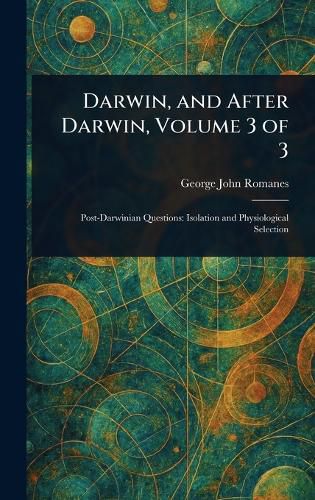Readings Newsletter
Become a Readings Member to make your shopping experience even easier.
Sign in or sign up for free!
You’re not far away from qualifying for FREE standard shipping within Australia
You’ve qualified for FREE standard shipping within Australia
The cart is loading…






This title is printed to order. This book may have been self-published. If so, we cannot guarantee the quality of the content. In the main most books will have gone through the editing process however some may not. We therefore suggest that you be aware of this before ordering this book. If in doubt check either the author or publisher’s details as we are unable to accept any returns unless they are faulty. Please contact us if you have any questions.
Dive into the ongoing discussion sparked by Charles Darwin's groundbreaking theories with "Darwin, and After Darwin (Vol 3 of 3): Post-Darwinian Questions: Isolation and Physiological Selection" by George John Romanes. This volume meticulously explores the intricacies of heredity and evolution, delving into crucial post-Darwinian questions.
Romanes investigates the significant roles of isolation and physiological selection in the evolutionary process. A vital contribution to the science of the late 19th century, this work examines the mechanisms behind natural selection and its impact on the diversity of life.
Explore the historical context surrounding the development of evolutionary thought, as this book dissects some of the key concepts debated after Darwin's initial publications. Essential reading for anyone interested in the history of science, evolutionary biology, and the ongoing quest to understand the origins of species. This edition ensures that Romanes's insights remain accessible.
This work has been selected by scholars as being culturally important, and is part of the knowledge base of civilization as we know it.
This work is in the public domain in the United States of America, and possibly other nations. Within the United States, you may freely copy and distribute this work, as no entity (individual or corporate) has a copyright on the body of the work.
Scholars believe, and we concur, that this work is important enough to be preserved, reproduced, and made generally available to the public. We appreciate your support of the preservation process, and thank you for being an important part of keeping this knowledge alive and relevant.
$9.00 standard shipping within Australia
FREE standard shipping within Australia for orders over $100.00
Express & International shipping calculated at checkout
This title is printed to order. This book may have been self-published. If so, we cannot guarantee the quality of the content. In the main most books will have gone through the editing process however some may not. We therefore suggest that you be aware of this before ordering this book. If in doubt check either the author or publisher’s details as we are unable to accept any returns unless they are faulty. Please contact us if you have any questions.
Dive into the ongoing discussion sparked by Charles Darwin's groundbreaking theories with "Darwin, and After Darwin (Vol 3 of 3): Post-Darwinian Questions: Isolation and Physiological Selection" by George John Romanes. This volume meticulously explores the intricacies of heredity and evolution, delving into crucial post-Darwinian questions.
Romanes investigates the significant roles of isolation and physiological selection in the evolutionary process. A vital contribution to the science of the late 19th century, this work examines the mechanisms behind natural selection and its impact on the diversity of life.
Explore the historical context surrounding the development of evolutionary thought, as this book dissects some of the key concepts debated after Darwin's initial publications. Essential reading for anyone interested in the history of science, evolutionary biology, and the ongoing quest to understand the origins of species. This edition ensures that Romanes's insights remain accessible.
This work has been selected by scholars as being culturally important, and is part of the knowledge base of civilization as we know it.
This work is in the public domain in the United States of America, and possibly other nations. Within the United States, you may freely copy and distribute this work, as no entity (individual or corporate) has a copyright on the body of the work.
Scholars believe, and we concur, that this work is important enough to be preserved, reproduced, and made generally available to the public. We appreciate your support of the preservation process, and thank you for being an important part of keeping this knowledge alive and relevant.